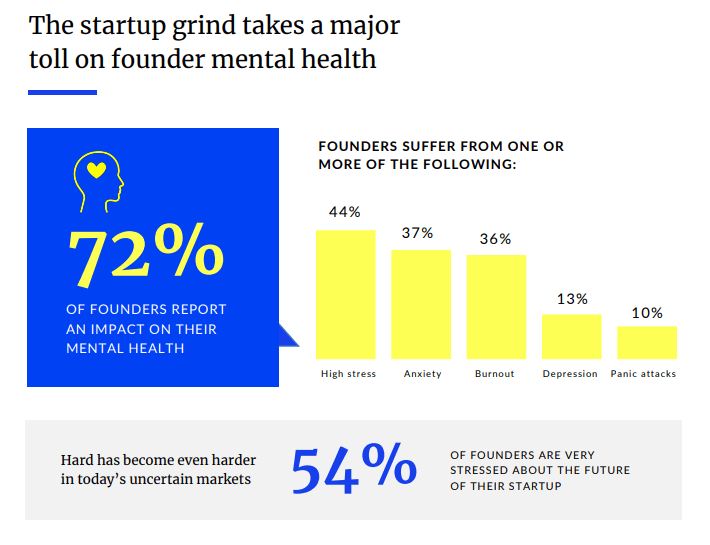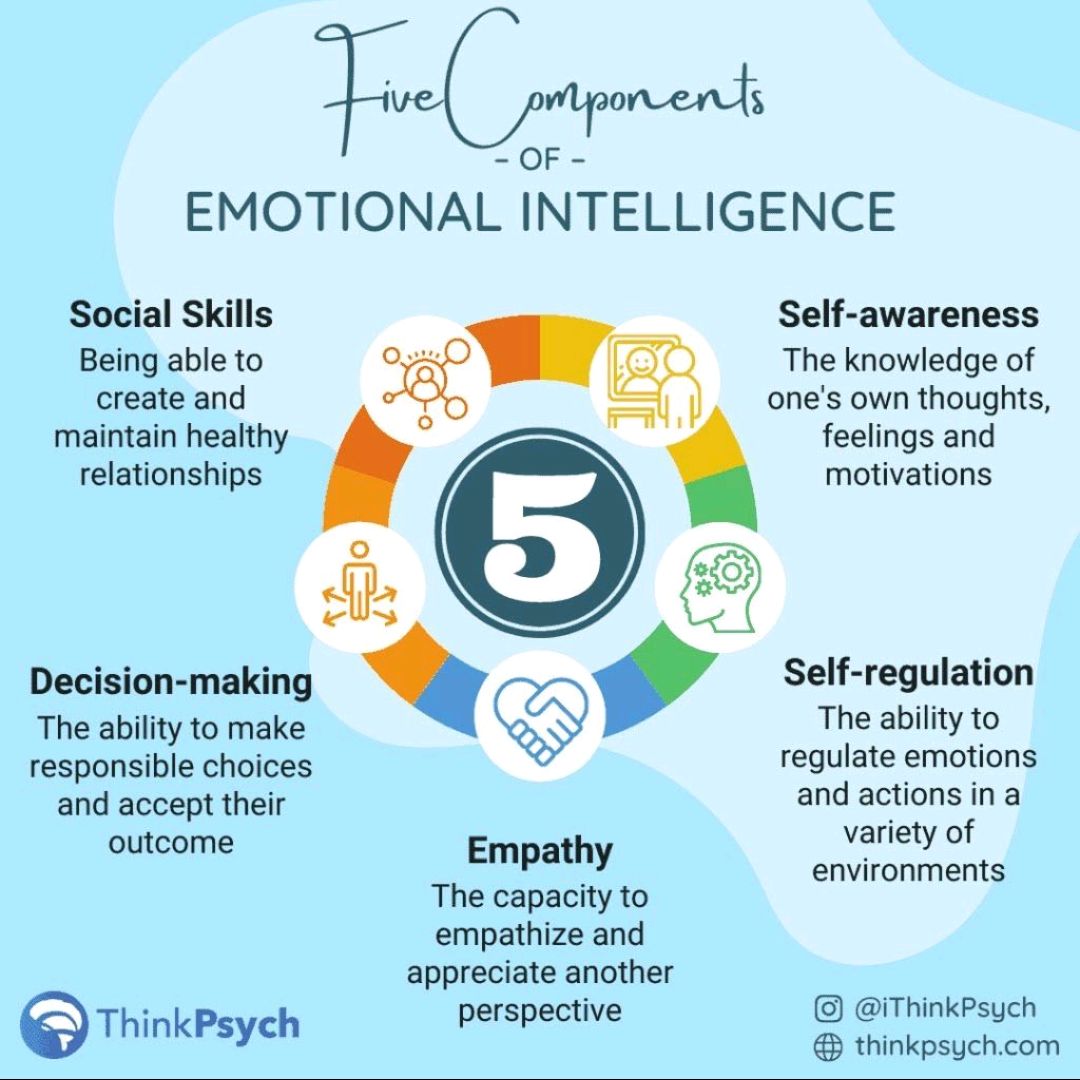As a startup founder, have you ever felt like your mental health was slipping due to feelings of imposter syndrome, depression, ADD/ADHD, high stress, or anxiety? You’re not alone – not even the slightest. Actually, most founders experience one of those things during one time or another. We’re going to talk about how founder mental health gets impacted and how you can improve yours.
Improving your mental health through the various strategies and mechanisms we share will make you feel better and perform better. And you’ll be able to lead your team better. While some paradigm shifts can happen immediately, some other improvements can take some time. We want to see you happy and productive, and founder mental health is a big issue in the startup ecosystem, where 72% of founders report an impact on their mental health. Don’t neglect yours – make sure that you read this post!
We’re not the only concerned party here. TechCrunch also talked about the need for investors and entrepreneurs to address the mental health crisis in startups, and they couldn’t be more right.
What Do Founders Experience?

While there are a host of issues that any person can experience, there are more common experiences of founders.
- Feelings of imposter syndrome
- Lack of self-worth
- High stress
- Panic attacks
- Procrastination
- Burnout
- 2X more likely to suffer from depression
- 6X more likely to suffer from ADHD
- 3X more likely to suffer from substance abuse
- 10X more likely to suffer from bi-polar disorder
- 2X more likely to have psychiatric hospitalization
- 2X more likely to have suicidal thoughts
As the solo founder of StartupDevKit, I’ve experienced a few of these things too. And the demands of startup founders are great, as you might have already noticed.
Common things founders deal with are:
- Juggling roles themselves (wearing many hats)
- Keeping your team together and functioning well
- Growth
- Product development
- Operations
- Cash flow
- Financial stress and uncertainty
- Hiring new people
- Fundraising
- Investors and board meetings
- Networking
- Planning
And that’s just work-related. Most startups have cash-flow problems and financial stress can be very difficult on founders and on their spouses or partners, or families too. In turn, if you don’t have support and understanding from them, it can exacerbate stress and anxiety. Then it makes you more likely to get burnt out and become depressed on top of being stressed and anxious.
The vicious cycle continues until you take action to fix it or until it ruins the relationship or yourself. Or have to quit your startup and get a new job. I’ve seen the latter happen with people and have heard numerous stories of this.
After the prevention-based content, we’ll dive into how to deal with the existing challenges you may be feeling.
Focus on Prevention if You’re Not Affected
Mental health affects so many of the decision-making processes that will determine whether or not your startup succeeds or fails. 90% of them do fail, and a lot of it stems from lapses in judgement, communication, and decision-making. These are all mental health-related.
8% of founders reported failing, in part, due to burnout from CB Insights’ first study on why startups fail and now in their second study, that number has dropped to 5%. But that doesn’t mental health in founders isn’t still an issue.
High stress, if left unmitigated, can lead to anxiety, burnout, panic attacks, and even depression if a founder or startup gets too stuck.
A combination of these issues makes things even more complex and is cause for intervention.
Prevention will most commonly be a mix of:
- Staying productive and meeting your monetary goals, making sure that you’re planning ahead and taking care of the most urgent and important things first
- Maintaining a work-life balance
- Staying on top of exercise, especially cardio
- Mindfulness, gratefulness, and meditation practices
- Maintaining positive friendships
- Spending dedicated time with your partner
- Eating clean, healthy food
- Fostering an inclusive, communicative, and diverse startup culture
- Making the best of each day as joyfully as possible
- Limiting alcohol and marijuana use
Let’s dive into healthy ways to deal with the previously aforementioned emotions and demands on both your time and energy.
Simple Strategies for Improving Founder Mental Health
Founders who are emotionally healthy are more likely to make better decisions rather than the opposite, where the inverse occurs.
Every founder will have one or more personal goals, and improving their mental health should be one of them. Make efforts to continually improve, for the sake of yourself, your romantic partner, business partners, and organization as a whole. As you do, you will become happier, feel better, others around you will noticed, and you’ll become an even better person in the process.
The first step is making the determination that you will work on yourself and/or improve your startup so your situational anxiety or depression can be alleviated.
The second step is planning. And the third step is taking focused action.
Let’s take a look at the ways you can overcome various challenges that affect founders’ mental health.
1) Overcoming Imposter Syndrome
What is imposter syndrome?
Imposter syndrome occurs when a person has not yet achieved success in their current role, leading to feelings of feeling like an imposter.
Dealing with imposter syndrome for startup founders
Imposter syndrome is common among startup founders. You’re not the only one. You can deal with these feelings in a multitude of ways. Did you know that overnight successes usually take three or more years to occur? Which means, there are no overnight successes!
The common adage is to fake it until you make it. Essentially, you be the change you want to see.
You take action to do the things that you want to achieve and set SMART goals (specific, measurable, actionable, relevant, timely) for yourself. And when doing so, you have to have compassion for yourself and not be too hard on yourself.
If your business idea and model were validated, you have a strong market, and have an audience, then you can make it work.
Focus on achieving tangible results and victory stacking. Create and stack small wins, day after day. Visualize yourself doing the work successfully, doing it quickly, and then follow your process and go and do it.
Often times, it’s the monotonous work that gets done day-in and day-out that will help your startup build traction and create compound effects for you to really take off.
Perform experimentation based on the lean startup methodology and trust in the process of doing the work.
2) Overcoming Self-Worth Perceptions
First know that you are worthy just the way you are. While this doesn’t mean you shouldn’t make efforts to improve yourself (everyone should), you should know that you’re worthy. Confidence is something that can be grown. If you can put in the effort to be the best person you can be, then you will usually find a way to make things work.
And, if your startup fails, that doesn’t mean that you’re any less of a person. But most founders who persevere through the really hard times, will eventually succeed.
Remember that you are not your startup. You are more than that – much more.
Keep in mind the principle of being rooted in the present and focusing on doing the things you need to do in each moment of the day. Take pride in doing that and the progress you make towards your goals.
Listening to podcasts like the School of Greatness by Lewis Howes, doing daily positive affirmations, or reading self-help books like The Seven Habits of Highly Effective People can be highly beneficial as a way to immerse yourself in positive and proactive thinking.
You can also learn about your deficits and what you need to work on, research those things, and then work on them. This can bring new found confidence. But also don’t be afraid to talk to a licensed therapist, as it can be highly beneficial for anyone.
3) Reducing Stress and Anxiety, Preventing Burnout
Stress is a response from your body that actually physiologically prepares your body for danger and it stimulates your sympathetic nervous system. It is not good to be constantly stressed as it will damage your body and will require more energy to heal from. The more stressed you are, the more likely you are to make poor lapses in judgement and mistakes that may not easily reversible.
We’ll go over ways to reduce your stress.
Where does anxiety come frome?
Anxiety comes from fear, especially fear of the unknown. So it’s important to deal with them in a healthy way and try to prevent their occurrence. And you absolutely can. Don’t worry.
Your stress and anxiety can be mitigated. And burnout can be prevented by practicing these healthy activities.
Let’s go through 12 ways to help you rock your life:
1) Daily Exercise
Exercise, especially 30 minute cardio sessions, will help to alleviate your stress and anxiety. It will also boost confidence levels and it releases endorphins to make you feel good. As founders who often sit at a desk all day, it’s doubly important to get your daily dose of exercise, as our bodies stiffen up by sitting all day.
If you can, take breaks to go for short walks so you keep your body happier and looser. And if you maintain good posture at your desk, you’ll prevent myriad neck, shoulder, and back issues, that you might otherwise accumulate that you would then have to correct after the fact.
Keeping a daily exercise schedule will enable you to remain in a rhythm and continue rolling with all matters growth. If you’ve never done it consistently, well, trust me when I say that it can transform your life.
2) Yoga
Yoga is a mind-body practice that builds, strength, flexibility, balance, and actively relieves stress. You don’t have to be a pro to do it, all you need is a yoga mat and a TV or laptop with YouTube so you can pull up some yoga videos.
Being one with your body and mind is a powerful practice that can help you focus and be rooted in the present. It’s very meditative and I highly recommend it for founders and people in the startup world like yourself.
Yoga with Adriene, is a very popular and great yoga channel on YouTube.
Similarly, Tai Chi and Qi Gong also serve a similar purpose, but Tai Chi is better for movement and exercise than Qi Gong, which is more blood flow and chi related. Those are also both YouTube links for beginners.
3) Meditation
Meditation, especially deep breath meditation can help you focus on the present, reduce your stress, become more mindful, bring more oxygen to your brain, reduce anxiety, and improve how you deal with your emotions. The benefits are numerous. Many founders swear by it and it has drastically improved their mental health.
There are quite a few meditation apps to help you get started and achieve better wellness. Calm is considered one of the best paid apps, and Smiling Mind is the best free meditation app.
But you don’t need an app to get started.
To meditate: Close your eyes and work on taking deep breaths, especially when you start feeling overwhelmed. Breathe in for 6-7 seconds, hold it for 1-2 seconds, and exhale for 8-9 seconds. Focus on your breath. It will start to relax your nervous system, ease stress, and reduce anxiety.
The apps though, provide guided meditations of various kinds.
4) Getting/Staying Organized
Have you ever had a really cluttered desk and felt like things were in disarray? But when your desk was clean, you felt relieved and like there was a weight taken off your shoulders?
Organization is more than just keeping a clean desk, but also being digitally organized and being productive too.
Check out our Guide to Mastering Time Management & Productivity. It will help you learn how to get and stay on top of your work.
Additionally, you can use project management and productivity software like Jira, Trello, ClickUp, Asana, Notion, Coda, AirTable, Monday, or others you may find to stay on top of your startup’s development and growth. And you can then schedule your tasks into digestible chunks in your calendar.
By keeping scheduling your tasks in your calendar ahead of time via time blocking, especially long projects that require repeating certain activities, you can make time for the things that may feel overwhelming. This makes it easier to complete your projects and reduce your stress. Doing these things can help you better manage ADD/ADHD too.
If you aren’t doing this already, planning and time blocking in your calendar will keep you much more organized and far less stressed and anxious.
It also reduces anxiety from not knowing what to do when to do it and it frees your mind up so you can focus on what you need to do at that given moment.
For startup founders’ mental health, productivity and organization are key to reaching your goals.
7) Heart to Heart Communication with Your Teammates for Conflict Resolution
When you open dialogue with teammates where it comes from the heart, you will usually be able to work out your differences with them. Problems with teammates can, more often than not, cause stress and anxiety. I’ve been there. The most important thing is to communicate with them to try and figure out a win-win scenario.
If you are still at an impasse by the end of the conversation, don’t leave it at that and avoid revisiting it. Table the conversation so you both can think about it and revisit it in a day or two. Problem or conflict resolution is of the utmost importance. If you don’t, it can eat you up inside. That’s no way to run a startup.
8) Go on Cathartic Nature Walks or Hikes
Nature is a powerful tool for emotional release. After a busy week or during your lunch time, try taking a walk in nature for 20-30 minutes, or even an hour. Studies have shown that people who take nature walks, like in botanical gardens, in parks, by the beach, or go on hikes have lower levels of stress than when they started the activity.
Being connected to nature and being immersed in it is a fulfilling and cathartic activity. Many entrepreneurs say they do their best thinking while they’re doing it. It certainly helps me!
9) Chanting Nam Myoho Renge Kyo (a SGI Buddhist chant) with positive goals in mind
Nam Myoho Renge Kyo means devotion to the mystic law of the universe that is the law of cause and effect, through intention, action, sound, and vibration. Vibration coming from the resonance of your chanting and positively affecting the energy of one’s surroundings. In the linked YouTube video, you’ll hear how to pronounce it.
It’s from a lay form of Buddhism called Nichiren Buddhism, and it’s a form of active meditation. While you chant, you think about and visualize manifesting your goals and dreams and taking the action to make them happen. And you also chant for other people’s happiness, not just one’s own. It’s very powerful, energizing, and focusing for oneself. It’s an excellent way to become happier, reduce stress, anxiety, and heal inner wounds. I’ve been a practitioner since the summer of 2008.
10) Gratefulness Affirmations
Write down what and who you’re grateful for, then read and recite them everyday. When you are grateful, your entire mindset can change. Count your blessings. It will be easier to move forward in your life and your startup when you are filled with gratitude.
11) Try Introspection
If you want to be your best self, then take stock of your difficulties and why you are having them so you can consciously work on them. Don’t let the stigma interfere with achieving happiness in your life. It’s okay to admit to yourself and others if you have a problem. We all have something. Try taking some time to do some introspection and think about the underlying reasons why you might be experiencing your specific challenge.
12) Work on Your Emotional Intelligence
You can take introspection a step further by learning about ways to become more emotionally intelligent. Becoming more emotionally intelligent will make it easier for you to process and express your thoughts and feelings.
The best startup leaders (and leaders in general) are the ones who are emotionally intelligent. It’s a skill like any other. So the more you practice it, the better you’ll get at it.
The five components of emotional intelligence
Resources to help you become more emotionally intelligent:
Each of the resources will provide additional insights that the other articles listed don’t necessarily share. Thus, I do suggest reading them all. They’re enlightening, especially for those who haven’t studied this before.
- Founder Survey: EQ Matters More Than IQ – Crunchbase
- Emotional Intelligence: The Startup Founder’s Secret Weapon – Paragon HQ
- How to Improve Your Emotional Intelligence – Harvard Professional Development
- Emotional Intelligence Skills and How to Develop Them – Positive Psychology
- How to Improve Emotional Intelligence – Tony Robbins
- Improving Emotional Intelligence (EQ) – HelpGuide.org
4) Try Therapy to Experience a Positive Impact on Your Mental Health
In startups, men outnumber women 4:1 and men are much less likely to go to therapy than women. Most of us dudes think there’s a stigma attached to it. But it doesn’t mean that you shouldn’t do it. I do it weekly, but most people don’t think like me. Therapy is a healthy way to get an unbiased opinion on things and an even better way to get past mental issues founders and people in general face. Going to therapy doesn’t mean you’re crazy. It means you’re human.
On the flip side, mentors who are experienced, and whom are emotionally intelligent, can play a similar role to therapists too — if they’re comfortable with that type of role. You’ve got to ask them if that’s something they’ll do with you. Sometimes people who have entrepreneurial experience can more easily understand the types of issues that you face and may be able to provide better advice on the business-side. But they aren’t licensed. So if your issues are purely startup-based, then they may be able to help you.
But more often than not, issues are caused by interactions with other people, and a licensed therapist is better equipped to help you deal with those challenges.
Make a positive change in your life with therapy or suggest the same for another person you know who’s struggling.
Here are three good options for online therapy:
Similarly, there are helpful YouTube channels by great psychologists like Yvette Erasmus, PhD, who specialize in transformative education for healing and growth.
Getting in-person therapy for improving founder mental health
The best way to find a licensed therapist for in-person visits is to go to your health care insurance website and look for psychologists and/or psychiatrists who accept your insurance and are nearby.
Then, look them up on Google to find their ratings so you can see what other people say about them.
Once you find a couple you’re interested in, reach out to them, and double check that they’re still seeing new patients and that they accept your insurance.
Then make an appointment and come prepared with what you’d like to work on and reasons why you think you experience those difficulties.
Conclusion
Taking care of your mental health is of the utmost priority. The mental affects the physical and vice versa, too. So neglect in one form will affect the other.
Activities we provided aren’t a substitute for a licensed therapist, so if you feel the need to speak to someone about your challenges, then we suggest seeing a licensed therapist.
However, the suggestions provided are a great way to get started on improving your mental health so you can become a happier person and a better founder.





